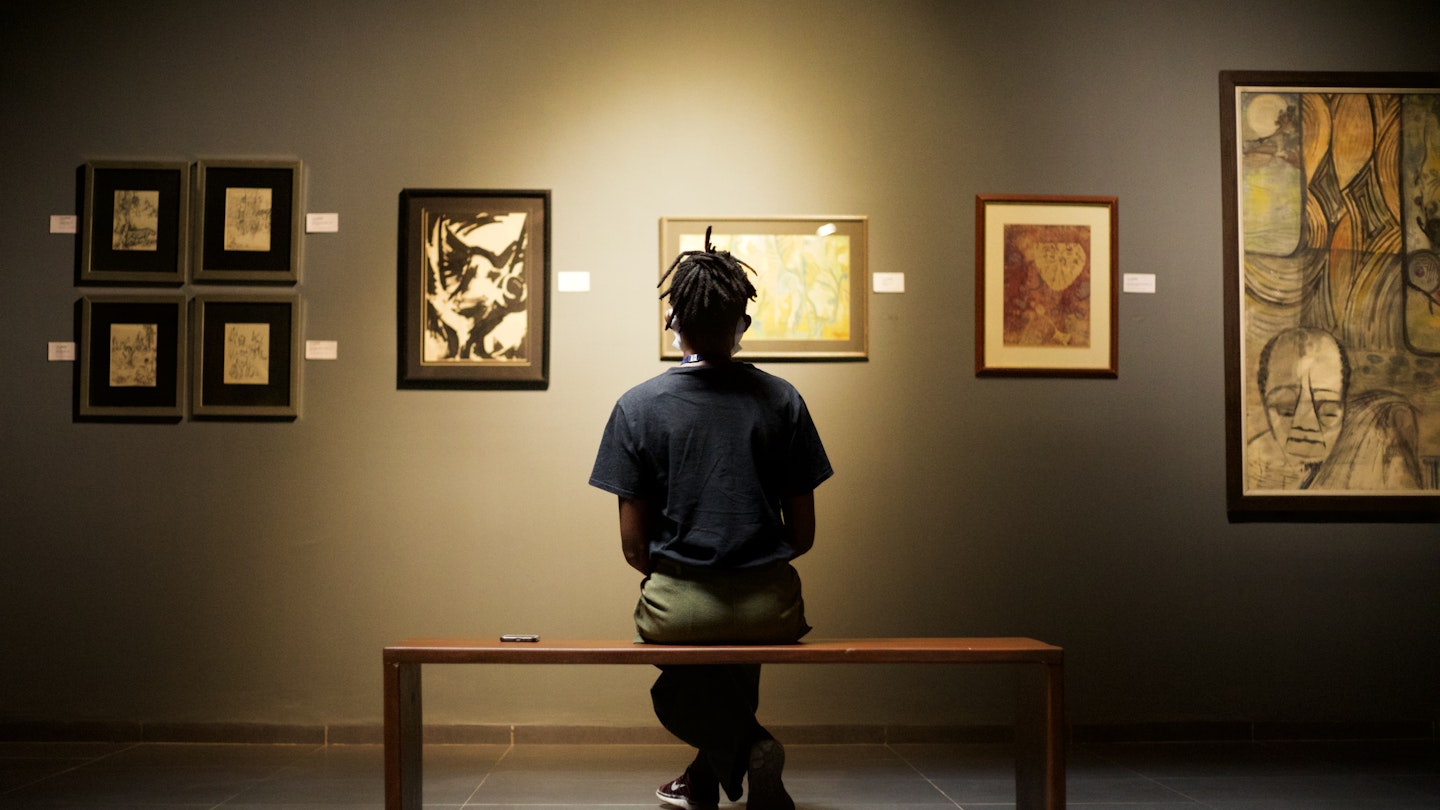Discover the Best Museums in Lagos, Nigeria
Lagos packs a punch when it comes to culture, thanks to Nollywood, a vibrant music and fashion scene – and a lineup of museums that range from staid to exciting.
In this city of roughly 20 million, museumgoers can visit colonial-era institutions now managed by the government to contemporary art galleries funded by private individuals. Many are easy to reach, while some will bring you to remote corners of the state. Moreover, perhaps the most exciting museum in Lagos yet – the John Randle Centre for Yoruba Culture and History – will open in the near future.
In the meantime, among those already welcoming visitors, here are the best museums in Lagos.
Consider Nigeria’s Extraordinary Culture at the National Museum
The National Museum was established in 1957 to house objects collected from archaeological digs across Nigeria. Visitors strolling through the museum’s breezy courtyard will take in rare carved stone objects and monoliths that are part of Nigeria’s rich ancient rock-art heritage.
- Such treasures as Ife and Nok terracottas and Benin Bronzes showcase the country’s stunning indigenous craftsmanship as far back as 900 BCE.
- Rotating exhibitions, such as Unfading Assets of Our Cultural Patrimony, also highlight objects from the permanent collection.
- The curators continually contextualize works like traditional stools, staffs, fly whisks, drums, and various royal ensembles, celebrating Nigeria’s diverse cultural heritage.
Superb Architecture Meets Contemporary Art at the Yemisi Shyllon Museum

The Yemisi Shyllon Museum of Art is one of the most exquisite works of architecture in Lagos. Situated on the campus of Pan-Atlantic University and opened to the public in 2020, this museum centers around a donation of around 1000 artworks by one of Nigeria’s foremost art collectors.
Visitors can expect an array of work by some of Nigeria’s most celebrated contemporary artists such as Aina Onabolu, Bruce Onabrakpeya, Ben Enwonwu, and more. The displays also feature vivid works by contemporary talents, alongside ancient archaeological objects and intricately carved traditional wooden pieces. After exploring the galleries, visitors can linger a while in the soothing sculpture park.
Contemplate the Legacy of Slavery at Badagry Heritage Museum
Visitors to Badagry look forward to stopping in at its Heritage Museum, the centerpiece of a network of institutions memorializing the transatlantic slave trade. Housed in a prefabricated one-story colonial-era building from 1863, this spacious compound includes various facilities that provide insight into this vital part of history.
The museum poignantly combines images, maps, illustrations, and actual relics to detail the evolution of slavery, from capture and resistance to its long-awaited abolition. Standing on the lagoon-facing balcony, visitors can see the historical port in the distance as well as Gberefu Island, from which enslaved individuals were marched.
Celebrate Progress at Freedom Park Museum
This museum is part of the larger Freedom Park facility on Broad Street, which has its roots in Lagos’ colonial past. Originally founded as a prison in 1872, the compound underwent significant changes after Nigeria’s independence in 1960.
Occupying the upper section of what was once the prison’s registry, the museum preserves the memory of the former jail. Visitors can see replicas of typical cells, carceral objects unearthed during renovations, the reconstruction of gallows, and much more. Photographic displays show the original prison buildings and the redevelopment stages from the late 2000s.
Juxtapose Black Art and Objects from Around the World at CBAAC Museum
Between January and February 1977, Lagos hosted the second World Black and African Festival of Arts and Culture (FESTAC), drawing participants from at least 60 countries. The objects from that exhibition make up the collection of the Center for Black African Arts and Civilisation (CBAAC) on Broad Street, showcasing diverse pieces including Australian Aboriginal art and ancestral objects from Ivory Coast.
Because it is managed by a government agency, it is only open on weekdays, and advance requests via email (cbaac77@yahoo.com) are necessary for tours.
Everyday Objects Tell the Story at the CRIMMD Museum
Where in Lagos would you find a Nigerian coin minted in 1910, an 1884 stamp, and a 1922 gramophone? The museum of the Center for Research, Information Management and Media Development (CRIMMD) preserves these historical artifacts and more, reflecting on Nigeria’s evolution from a colony into an independent nation.
- A variety of everyday objects, from turntables to royal staffs, provide insight into the past.
- The museum’s photographic collection boasts over 20,000 images encapsulating Nigeria’s rich history.
Step Back into a Groovier Time at Vintage Africana

Imagine the living room of a middle-class Nigerian family in the 1970s and ’80s. The space features a variety of nostalgic items, including a black-and-white television and a cassette player.
Vintage Africana offers a fascinating trip back in time, showcasing familiar objects from the past to educate the younger generation about Nigeria’s rich history. A vintage Volkswagen and a Mercedes Benz 190, two iconic vehicles of that era, enhance the experience.
Trash Gets Transformed into Treasure at the Junkyard Museum of Awkward Things
What society throws away, the Junkman of Africa (known as Dilomprizulike) transforms into art. With a career spanning five decades, he began his journey by interning with world-famous artist El Anatsui.
Over the years, he has collected a vast array of beautiful debris, exhibited both locally and internationally. This unique collection can now be seen at his museum in Lekki, a delightful spot that is evolving into a creative space for artists worldwide. The Junkman plans to host workshops and community-centered projects for young artists.





